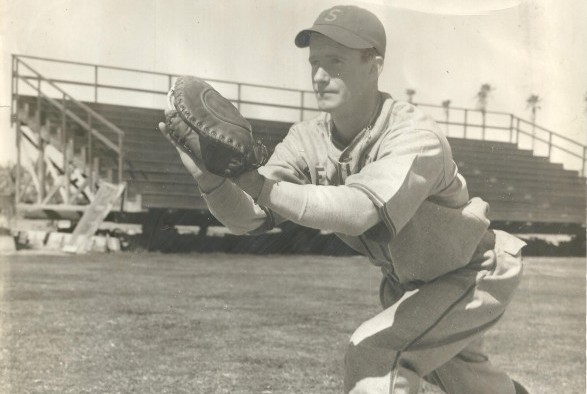
By David Eskenazi and Steve Rudman
Last week, in what one ESPN blogger described as a throwback game for the ages, Ichiro went 7-for-8 in leading New York to a day-night doubleheader sweep of the Toronto Blue Jays at Yankee Stadium. The former Mariner icon, flourishing in the Big Apple, made a game-saving catch in the opener, had the game-winning hit in the nightcap and became only the fourth player in the live-ball era to record a pair of four-hit, four-steal games in his career.
Ichiros first four-hit, four-steal game occurred July 20, 2004, when he played in Seattle was en route to a record, 262-hit season.
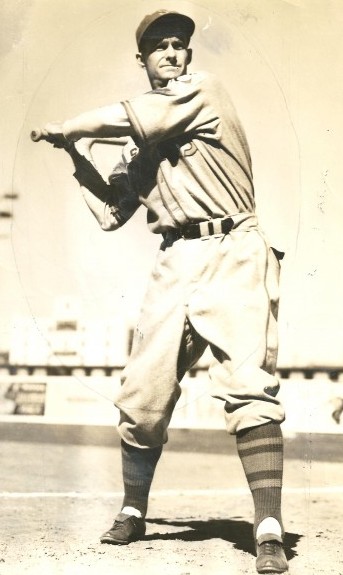
It was just an unbelievable day, and that two-out hit in the eighth inning (second game) just kind of capped it off, said Yankee manager Joe Girardi, after Ichiro became the first Yankee with seven hits in a doubleheader since Hall of Famer Dave Winfield Sept. 18, 1983.
Thats tough to do. I dont think Ive ever done that in a doubleheader. I dont think Ive ever seen a player do something like that, added Yankee captain Derek Jeter.
Mariners fans saw plenty out of Ichiro during his first 10 years in Seattle, including 10 consecutive 200-hit seasons, but never anything like a 7-for-8 doubleheader, which included a 4-for-4 performance with four steals in Game 2, although he twice came close.
On June 8, 2003, Ichiro went 6-for-11 (4-for-6 with two stolen bases in the opener and 2-for-5 in the nightcap) in a doubleheader sweep of the Mets at Shea Stadium. Slightly more than a year later, Aug. 3, 2004, Ichiro went 5-for-5 in a 9-7 loss to Baltimore in the first game, and came back after entering the second game as a pinch runner to go 1-for-1, giving him a 6-for-6 twin bill.
In a different league (Pacific Coast) and in a different time (1939), a Seattle baseball player enjoyed a day at least as productive as Ichiros, perhaps more so. In fact, with one more single, his achievement would have been an historic one in local athletic lore. The date was July 4 and manager Jack Lelivelts Rainiers were in Hollywood for a holiday doubleheader against the Stars.
Lelivelts first baseman, George Archie, joined the Rainiers, along with Jo Jo White (see Wayback Machine: Jo Jo, Sparkplug From ‘Joe-Jah’), the previous winter after the Detroit Tigers sent them to Seattle as partial compensation for taking star pitcher Fred Hutchinson out of his hometown (see Wayback Machine: Hutch A Man And An Award).
Archie was 25 years old, had come out of Nashville (born April 27,, 1914) and was in his fifth year of professional baseball, having apprenticed with a variety of teams in Detroits minor league system between 1934-38.
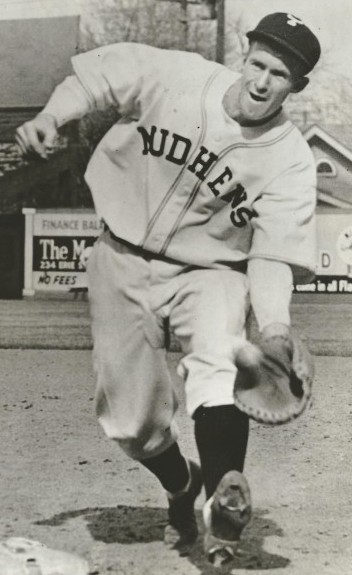
He signed his first pro contract with the Tigers (inked by scout Eddie Goostree) in the fall of 1933 and spent his first season (1934) with the Class C Muskogee Tigers of the Western Association.
Archie next played for the Class A Beaumont Exporters in the Texas League in 1935-36 and in 1937 worked for the AA Indianapolis Indians of the American Association.
In 1938, Archie moved to the Toledo Mud Hens, also of the American Association, and batted .312 with 188 hits, 33 doubles, 10 triples and five home runs, earning a promotion to the major leagues for the final month of the season.
Archie saw action in three games, primarily as a pinch runner, and went 0-for-2. The Tigers liked what they saw in him, but liked what they saw in Hutchinson even more and made Archie part of the package they sent to Seattle for the young pitcher.
The Rainiers liked Archies upside enough that they parted with their own first baseman, Len Gabrielson, who hit .310 in 170 games in 1938, when the Rainiers made a serious run at a PCL championship (see Wayback Machine: Rainiers & Pitchers of Beer).
Archie hit .330 and pilfered 27 bases for the 1939 Rainiers, collecting 216 hits in 664 at-bats. By far his best day came July 4 when he had seven hits in 10 at-bats, the knocks coming in this sequence: With Hal Turpin trailing after three innings, Archie delivered a home run, triple, double and a single, scored twice and drove in three runs, leading Seattle to an 11-4 victory.
With Kewpie Dick Barrett on the mound in Game 2, seeking his 15th victory, Archie followed up on his Game 1 cycle by hitting a home run in his first at-bat., a triple in his second and a double in his third as the Rainiers defeated Hollywood 13-4.
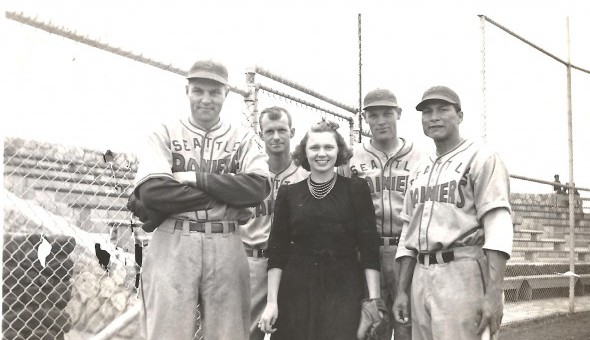
In the years Archie played, PCL doubleheaders included a nine-inning first game and a seven-inning second game. Had the second game gone nine innings, Archie would have received a fourth at-bat, carrying with it a chance to hit a single and produce a cycle in both ends of the doubleheader.
As it was, Archie had seven hits in 10 at-bats over the two games, six for extra bases, drove in seven runs and scored six. In his doubleheader last week, Ichiro had six singles, one double, scored twice and delivered one RBI.
Oddly enough, news of Archies near double cycle didnt make The Times story until the seventh paragraph, and Archie never said a word about it to the newspapers. In fact, he never said much of anything.
He might say six words in a day, teammate Buddy Hancken told an interviewer. But he was a flat-out, good ballplayer, a good base runner and a good fielder.
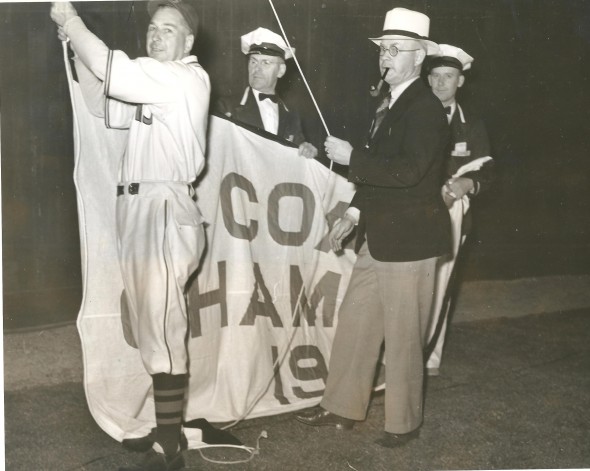
After playing in all 174 Rainiers games in 1939, when the club won the first of three Pacific Coast League championships, PCL media began to speculate on which players would draw the most interest from major league team at the winter meetings.
Three headed the list: Dom DiMaggio of the San Francisco Seals, Seattle pitcher Les Webber, who had won 17 games, and Archie, whose services Washington Senators owner Clark Griffith had tried to acquire with a $15,000 offer at midseason.
But Lelivelt refused to part with his first baseman, telling Griffith, We wont break up our club in the middle of the year by selling players (see Wayback Machine: Jack Lelivelts Seattle Rainiers).
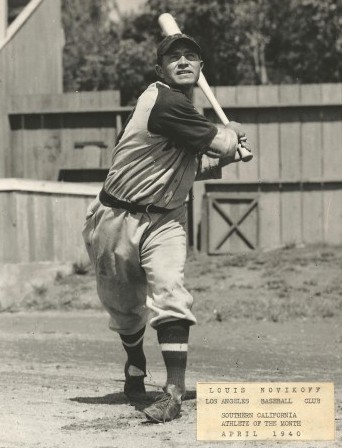
So Archie finished out 1939 in Seattle. Shortly after the season ended, Griffith acquired Zeke Bonura from the White Sox to play first base in 1940, so he didnt repeat his offer for Archie, who settled in for a second season with the Rainiers.
Archie did not get off to a great start, the result, perhaps, of the fact that, toward the end of spring training, Rainiers pitcher Mike Burdick accidentally beaned him during a spring training workout.
Although Archie scored five runs in a 16-6 Rainiers win over San Francisco April 9, 1940, he didnt hit his stride until July 5, when he tripled, doubled and singled in a 6-3 win over the Portland Beavers.
Nine days later, in a July 14 doubleheader against San Francisco, Archie smacked two doubles, five singles and drove in five runs. By August, he was the leading candidate, according to a poll of West Coast baseball writers, for the PCLs Most Valuable Player.
The surprise with the poll results was that Lou Novikoff of the Los Angeles Angels happened to be in the midst of a monster season. Noviloff, who would spend the 1946-48 campaigns with the Rainiers (see Wayback Machine: Mad Russian Lou Novikoff) went on to win the PCLs Triple Crown with a .363 average, 41 home runs and 170 RBIs.
Archie batted .324 with 217 hits, but his average was 39 points lower than Novikoffs. Archie also hit 33 fewer homers and collected 75 fewer RBIs. But Archie led the league with 46 doubles, was the only PCL player to appear in every inning of all 178 games (he didnt miss an at-bat) and, on Sept. 5, had ignited a last-inning rally with a leadoff single that enabled the Rainiers to push across two runs and defeat Sacramento 3-2 and clinch the clubs second consecutive PCL championship.
All of that factored into an eight-man Pacific Coast League boards decision to select Archie for the annual Sporting News award by a five-point margin over Novikoff.
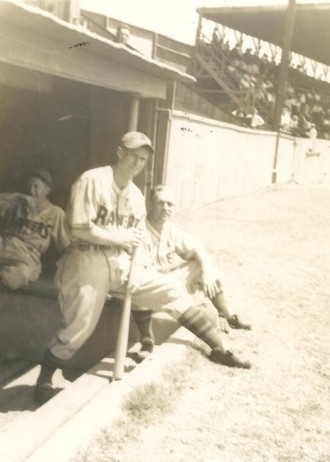
Two weeks later, the Senators sold Bonura to the Chicago Cubs and immediately seized on Archie as his replacement, drafting him off the Seattle roster for the standard $7,500 price, half of what Griffith was willing to pay a year earlier.
When Archie departed Seattle, he had appeared in 353 games, with back-to-back seasons of 216 (1939) and 217 hits (1940), along with 80 doubles, 25 triples, 15 home runs and consecutive batting averages of .330 and .324.
Archie served as the regular third baseman for the 1941 Washington Senators and in 105 games hit .269 with 27 extra-base hits. On Sept. 10, the Senators traded Archie to the St. Louis Browns, who also employed Yakima infielder Harlond Clift, for Bobby Estalella, and he hit .379 in nine games to close out the season.
George Archie would not appear in another major league game until 1946.
That December, Archie joined the U.S. Army at Camp Forrest, TN., near his off-season Nashville home. In 1942, the Army stationed Archie at Jefferson Barracks, MO, Reception Center and he played baseball there.
In 1943, Archie moved to Ft. Riley, KS, where he was named National Baseball Congress Most Valuable Player for helping lead the Camp Wheeler Spokes to the NBC World Series title. In 1944, Archie played ball at Camp Shelby, MS.
Archie went overseas with the 65th Infantry Division in 1945 and served in Germany, Austria and France under General George Patton. After Germany surrendered, Archie played first base with the 65th Infantry Division baseball team with Harry Walker, Ken Heintzelman and George Scharein, three other major leaguers involved in the war effort.
After the Army discharged Archie in January 1946, he rejoined the Browns. He was 32 and away from the major leagues for four years. The Browns released Archie after just four games with him batting .182. Had it not been for World War II, Archie probably would have had a nice run in the majors.
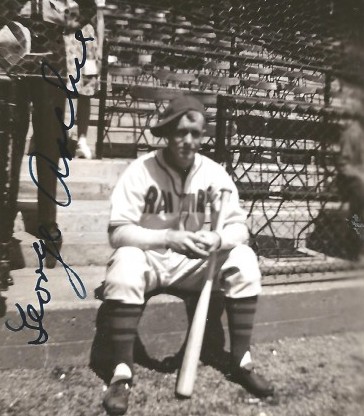
Archies most notable day in the major leagues came July 23, 1941, when he matched his career high with three hits, including a home run, off future Hall of Famer Lefty Grove.
I came back after the war but I had lost too much, Archie told an interviewer. The eyesight wasnt there and I didnt have the speed anymore.
That didnt deter the Los Angeles Angels from signing him for the balance of the 1946 season, but Archie hit only .258 in 130 games, ending his career at the highest minor-league level.
Archie moved down in class to AA San Antonio of the American Association for the 1947-48 seasons, and down even further to Class B Texarkana of the Big State League in 1949-50. He hit .331 in 82 games as player/manage his final year, his playing career ending when he tore up a knee. In 12 minor league seasons at all levels, Archie hit .305 with 117 home runs.
After his baseball career ended, Archie returned home to Nashville and took a shipyard job, which he held for 28 years. For three of those (1965-67), Archie served as baseball coach at Vanderbilt University.
Archie played for 11 professional organizations during his career. Although he spent only two seasons in Seattle, he always ranked his experience with the Rainiers as the highlight of his career.
We all live our dreams anyway, Archie told Rich Johnson of The Times in 1991, and I had a lot of them in Seattle.
Archie, who lost his prime baseball years (28-31) to World War II, passed away in Nashville Sept. 20, 2001, at the age of 87.
“George was a real hero, but I’m not talking about baseball,” long-time friend Herb Connelly of Seattle told The Times when it asked him about Archie. “He gave up his career to go with General George Patton into Germany, Austria and France. That was his real legacy.”
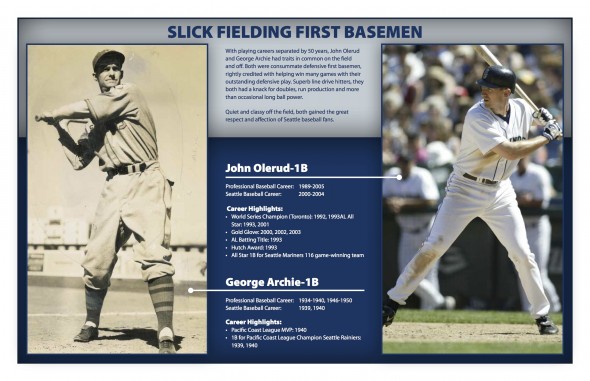
———————————————
Many of the historic images published on Sportspress Northwest are provided by resident Northwest sports history aficionado David Eskenazi. Check out Davids Wayback Machine Archive. David can be reached at (206) 441-1900, or at seattlesportshistory@gmail.com
.
